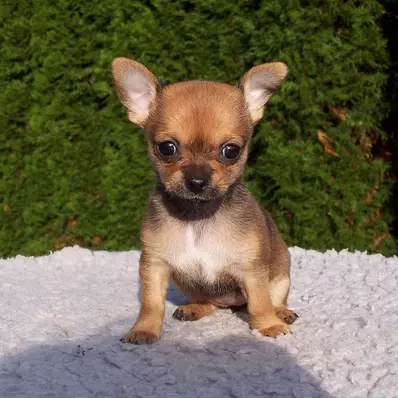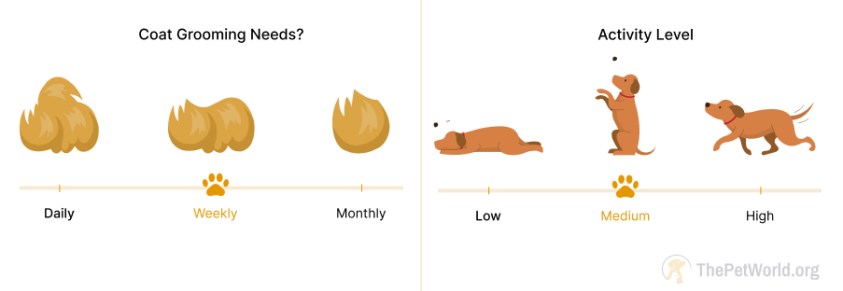Chihuahua History/Origin
Chihuahua’s origins are unclear, and there are two main theories. One suggests they descended from the Techichi, a dog from Central or South America, dating back to the Toltec civilization. Carvings from the 9th century C.E. depict a dog resembling the Chihuahua.
These purebred dogs were later absorbed into Aztec society, believed to have mystical powers, and used in rituals. The Techichi faded into obscurity after the Spanish conquest in the late 1500s.
The second theory posits that small hairless dogs from China were brought to Mexico by Spanish traders and bred with native dogs. The modern shorthaired Chihuahua dog breed was discovered in the 1850s in the Mexican state of Chihuahua.
American visitors brought them home, and by 1890, they began to be shown. The first Chihuahua registered with the American Kennel Club under Toy Group was Midget in 1904.
Chihuahua History- Source: The Chihuahua Club Of NSW Inc.
The longhaired variety likely resulted from crosses with Papillons or Pomeranians. The breed’s popularity surged in the 1930s and 1940s, partly due to its association with Latin music bandleader Xavier Cugat. Since the 1960s, Chihuahuas have consistently ranked among the most popular AKC breeds.
Chihuahua Personality
The bold and confident Chihuahua is one of the dog breeds that often likened to a terrier. Their alert nature and the wariness of strangers make them excellent watchdogs.
Sensitive and affectionate, these dogs thrive on companionship and frequently form strong bonds with a single person, although they can become friendly with others if properly introduced.
Initially, they may be reserved, and they can be timid without proper socialization as puppies. Like all dogs, they require early socialization, which includes exposure to various people, sights, sounds, and experiences to ensure they grow into well-rounded adults.
- Training challenges
Training a Chihuahua can present several challenges due to their strong-willed and independent nature. Their small size often leads owners to overlook training, but it’s essential for good behavior.
Chihuahuas can be stubborn and may resist commands, requiring patience and consistency from their owners. They also tend to be protective and can become possessive of their owners, leading to aggressive behavior if not properly managed.
Additionally, housebreaking can be difficult with this breed, as they are prone to accidents indoors. Despite these challenges, positive reinforcement and early socialization are key to successfully training a Chihuahua.
Chihuahua Physical Appearance
Chihuahuas have one of two head shapes: ‘apple head’ or ‘deer head.’ ‘Apple head’ Chihuahuas have rounder heads, close-set eyes, shorter legs, and smaller ears, and they tend to be the most popular. In contrast, ‘deer head‘ Chihuahuas have flatter heads, wide-set eyes, longer legs, and larger ears.
- Size
The average Chihuahua weighs between 3 to 6 pounds. While there are smaller Chihuahuas, they often have health issues. Conversely, some Chihuahuas can be larger, reaching 12 pounds or more, and these can be better suited for families with children.
- Coat color
The Chihuahua comes in two types of coat: long and short. The long coat of the Chihuahua is soft, either flat or with a slight curl, and is often accompanied by an undercoat. Feathering on the feet and legs, as well as a large ruff around the neck, are common features. Similarly, the short, smooth coat is soft to the touch.
Chihuahuas exhibit a diverse range of coat colors, including black, white, fawn, chocolate, gray, and silver as well as tricolor. They may have solid, pied, marked, or splashed patterns.
Chihuahua Gender Differences
- Size differences
The male Chihuahua typically reaches an average height of 5 to 9 inches and weighs between 2 to 6 pounds when fully grown. On the other hand, female Chihuahuas tend to be slightly smaller, with an average height ranging from 4 to 7 inches and a similar weight range of 2 to 6 pounds.
- Temperament differences
Male Chihuahuas tend to exhibit clingier and more insecure behavior. They often dislike being separated from their owners and seek constant reassurance of affection. While this can be charming initially, it may become tiresome over time.
On the other hand, female Chihuahuas are generally less affectionate and may appear standoffish towards individuals other than their favorite human. They require less attention and are content with independence.
Chihuahua Feed/Nutrition
The recommended daily intake for adult Chihuahuas is typically between 1/4 to 1/2 cups of high-quality dry food. However, it’s essential to consider factors such as size, age, metabolism, and activity level when determining the appropriate amount.
Just like humans, dogs have individual dietary needs, so the quantity may vary from one dog to another. You can also incorporate treats like strawberries in moderation, as they are low-calorie and packed with nutrients.
More active dogs will generally require a larger portion compared to less active ones. Additionally, the quality of dog food plays a crucial role, as premium quality food provides better nutrition, requiring smaller servings to meet nutritional requirements.
Chihuahua Health
The Chihuahua, like all breeds, may be susceptible to certain health conditions, either congenital or acquired. While not all Chihuahuas will develop these ailments, breeders, and owners need to be knowledgeable about them to ensure proper care throughout the dog’s life.
- Hypoglycemia: Low blood sugar can be a concern, especially in toy breed puppies, leading to symptoms such as lethargy, trembling, or even collapse. Prevent hypoglycemia by feeding your Chihuahua small, frequent meals to maintain stable blood sugar levels. Keep honey or sugar paste on hand to administer immediately if symptoms of hypoglycemia, such as lethargy or trembling, occur.
- Pulmonic Stenosis: This congenital heart condition obstructs blood flow due to a malformed pulmonic valve, potentially leading to heart failure. Treatment varies based on the extent of the obstruction. Avoid strenuous activities that may exacerbate symptoms of pulmonic stenosis and follow your veterinarian’s recommendations for managing the condition. Regular cardiac evaluations can help monitor the progression of the disease and guide treatment decisions.
- Collapsed Trachea: The accumulation of cerebrospinal fluid in the brain can exert pressure, leading to various neurological symptoms. Treatment options include medication or surgical intervention. Rapid inhalation of air can cause the trachea to flatten, hindering breathing. Preventive measures for a collapsed trachea include using a harness instead of a collar to reduce pressure on the neck and throat. Avoid exposure to irritants such as smoke or strong fumes, which can aggravate tracheal inflammation.
- Progressive Retinal Atrophy: PRA is a hereditary eye problem that affects the retina, leading to gradual vision loss and eventual blindness. Symptoms typically begin with decreased night vision and progress to complete blindness over time. While there is no cure for PRA, early detection through regular veterinary eye exams can help manage the condition and slow its progression.
- Obesity: Prevent obesity in your Chihuahua by feeding a balanced diet and monitoring portion sizes to maintain a healthy weight. Incorporate regular exercise into your dog’s routine to promote physical fitness and prevent excessive weight gain. Avoid overfeeding or excessive treats, and consult with your veterinarian for personalized dietary and exercise recommendations.
- Syringomyelia: A chronic condition affecting the spinal cord, characterized by fluid-filled cavities that can cause pain and neurological symptoms. Preventing syringomyelia involves careful breeding practices to reduce the risk of passing on genetic predispositions. Monitor your Chihuahua for any signs of discomfort or neurological abnormalities and seek veterinary care promptly if concerns arise.
Chihuahua Care and Grooming
Chihuahuas have lower exercise needs compared to some other breeds, typically requiring 30 minutes to 1 hour of activity daily. This can be met with short walks, play sessions, and interactive toys.
Grooming a Chihuahua is easy and quick, only needing a few minutes each week. Use a rubber grooming mitt or short-bristled brush for smooth-coated Chihuahuas, and a pin brush for longhaired ones. Regular brushing helps control shedding, especially in spring and fall. Baths are needed every month or two, using dog shampoo to keep the coat and skin healthy.
Keep nails trimmed regularly and brush their teeth a few times a week to prevent tartar buildup and dental disease. Check for any sores, infections, or abnormalities during grooming to ensure your Chihuahua stays healthy.
Additionally, crate training your dog is essential for creating a safe and secure space for them, especially when you’re not around. It also aids in house training and preventing destructive behavior.
Chihuahua Rescue Groups
A Chihuahua rescue group offers a sanctuary for these tiny dogs facing hardship. They rescue Chihuahuas from shelters or abusive situations, providing care and rehabilitation. Through adoption events and community outreach, they raise awareness and find loving homes for these vulnerable dogs.
How Much Does Chihuahua Cost?
The price of a Chihuahua typically ranges from $800 to $1,500, depending on factors such as breeder reputation, pedigree, and location.
Chihuahua puppies are available for sale from reputable breeders who prioritize the health and temperament of their dogs. It’s essential to visit the breeder, meets the puppies, and observe their parents to ensure they are healthy and well-socialized.
Interesting Facts
- Chihuahuas are known to shiver when they are excited, stressed, or cold. This is a common trait and usually not a cause for concern.
- Relative to their body size, Chihuahuas have the largest brains of any dog breed.
- They have appeared in Beverly Hills Chihuahua.
Beverly Hills Chihuahua 2- Source: IMDb
- Chihuahua has appeared in a TV show called Legally Blonde.
Legally Blonde- Source: The Mirror
Best For
Chihuahuas are ideal for apartment living and novice pet owners due to their small size and minimal grooming needs. They make excellent companions, forming strong bonds with their owners and acting as alert watchdogs. While good with older children, they require gentle handling due to their fragile nature.
Top Names
| Male Chihuahuas Names | Female Chihuahuas Names |
| Max | Bella |
| Rocky | Daisy |
| Buddy | Lola |
| Charlie | Coco |
| Oscar | Lucy |









 Chihuahua History- Source:
Chihuahua History- Source: 

 White Chihuahua- Source:
White Chihuahua- Source:  Brown Chihuahua- Source:
Brown Chihuahua- Source:  White Chihuahua with Brown markings- Source:
White Chihuahua with Brown markings- Source:  Black Chihuahua – Source:
Black Chihuahua – Source: 
 Beverly Hills Chihuahua 2- Source:
Beverly Hills Chihuahua 2- Source:  Legally Blonde- Source:
Legally Blonde- Source: 






